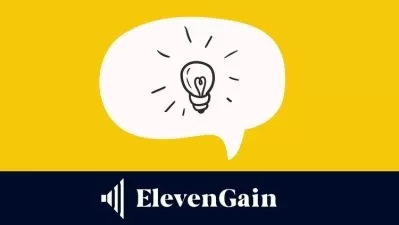The Entrepreneur's Toolkit
Michael G. Goldsby
12:44:06
Description
The numbers are staggering. According to the Small Business Administration, two-thirds of all new businesses fail in their first decade of operation. What does it take to become one of the prosperous few? How does a promising idea survive the startup phase, pass the break-even point, and eventually grow into a flourishing enterprise? In short, what are the tools that entrepreneurs need to succeed?
The answer is critically important. After all, an entrepreneurial spirit is vital to society for many reasons:
- Great businesses depend on the ability of entrepreneurs to handle unpredictable challenges and seize unrecognized opportunities.
- Entrepreneurship applies not just to businesses, but also to many areas, including education, non-profit organizations, sports, and government.
- The world is teeming with breakthrough ideas, but it takes entrepreneurial skills to make them happen.
- Entrepreneurs have created more wealth, more jobs, and more progress than any other force in society; they are truly indispensible.
Taking a risk on a new business or other enterprise can be daunting, but the rules are simple and the payoff is immensely gratifying. It all starts with an idea, a few basic principles, an organizational checklist, and a research plan—a set of tools that helps you build your way to success.
The Entrepreneur’s Toolkit is that resource, teaching you how to get started and overcome the many obstacles on the path to a profitable and rewarding venture, whatever it may be. Taught by Professor Michael G. Goldsby of Ball State University, who heads one of the nation’s premier undergraduate and graduate programs in entrepreneurship, these 24 half-hour lectures give you the background and skills to get ahead in today’s competitive marketplace.
By following Professor Goldsby’s proven path, you can embark on your own enterprise with confidence. His presentation is filled with useful tips, case histories, and personal anecdotes, along with a wealth of recommendations for websites and other outside resources, which are cited in the lectures and the course guidebook. These include key agencies and professional organizations, plus sources of vital information such as patent databases, industry standards, and government regulations that apply to your business.
A Course for the Entrepreneur in Everybody
All of us have dreams, goals, and perhaps a project or two on the back burner. The Entrepreneur’s Toolkit is your chance to make these aspirations a reality. Professor Goldsby provides a detailed roadmap for starting, nurturing, expanding, and eventually selling a business; and he shows how the same valuable skills translate to other spheres of life. Those who will benefit from Dr. Goldsby’s engaging presentation include
- anyone thinking of going into business, whether it’s a freelance career, a small store, a franchise, or an ambitious startup;
- those already in business who want to rejuvenate their organization and make it thrive;
- employees who want to get ahead in their present company, using the tools of entrepreneurship to build their career;
- teachers, ministers, club presidents, and others in leadership positions who want to make a difference in their field;
- people who deal with entrepreneurs, from screenwriters pitching a movie to sales representatives trying to win a contract; and
- anyone who loves a rags-to-riches story—because the annals of entrepreneurship are filled with inspiring biographies.
Get the Big Things Right
Starting a new business means paying attention to countless details. No one can do a perfect job, but the future of your organization depends on getting the big things right. The Entrepreneur’s Toolkit helps you focus on the most important elements. You begin with the preliminaries: coming up with an idea for a business, market research, establishing the feasibility of your concept, recognizing how to make a profit, and choosing a business structure.
Then you devote fully one-third of the course to the business plan, which is like a global positioning system for your enterprise; it lets you know where you are, where you’re going, and how to get there. It’s an essential document for investors, lenders, potential partners, and big customers, and it helps you think through your venture and define and meet your goals. Dr. Goldsby covers the standard parts of a business plan and explains in detail the financial sections that give many beginning entrepreneurs the most trouble, including income statements, balance sheets, and cash flow statements.
Next you follow up with lectures that address crucial questions: how to get financing, how to make a home office prosper, how to start a family business, and how to buy a franchise or existing business.
Having guided you through the steps in the startup phase, Professor Goldsby devotes the final lectures to ensuring the growth of your enterprise as well as your own personal growth as an entrepreneur. These lectures cover intellectual property, employee relations, customer relations, entrepreneurship in the bigger picture, entrepreneurial exhaustion, how successful entrepreneurs think, and what’s next in your career after success.
Role Models for Business and More
There are plenty of role models in entrepreneurship, and some of the most famous launched their ventures on a shoestring. For instance, a nondescript garage in Palo Alto, California, is where Dave Packard and Bill Hewlett started the electronics firm Hewlett-Packard in 1939, paving the way for an entire industry—Silicon Valley. Down the road in Los Altos is another small garage where Steve Jobs and Steve Wozniak started Apple Computer in 1976. You hear these stories and many others in The Entrepreneur’s Toolkit, including
- Walt Disney: “The way to get started is to quit talking and start doing,” advised this legendary showman, who is unusual in exemplifying the entire spectrum of entrepreneurial traits analyzed by Professor Goldsby in Lecture 21.
- Edwin Land: “If you can define a problem, it can be solved,” said this gifted inventor, whose development of instant photography and the Polaroid camera inspired Steve Jobs to create products that his competitors could not even imagine.
- Nick Saban: How is the head football coach of the University of Alabama a model entrepreneur? Nick Saban revived the storied glory of the “Crimson Tide” by bringing the discipline and organization of a Fortune 500 company to his struggling team.
- Bill Gates: Lecture 24 addresses the role of entrepreneurs as philanthropists, illustrated by Bill Gates, who retired from Microsoft to devote his life to the Bill and Melinda Gates Foundation, dedicated to fighting malaria and other global problems.
The bottom line, says Professor Goldsby, is that the entrepreneurial skills that helped bring success and fulfillment to Bill Gates, Steve Jobs, Walt Disney, and so many others can be learned by anyone who’s willing to build the right toolkit to get it done.
More details
User Reviews
Rating
Michael G. Goldsby
Instructor's CoursesDr. Michael G. Goldsby is the Stoops Distinguished Professor of Entrepreneurship and Executive Director of the Entrepreneurship Center in the Miller College of Business at Ball State University. He earned his undergraduate degree in Business Economics and Public Policy from the Kelley School of Business at Indiana University, his master’s degree in Economics from Indiana State University, and his doctorate in Strategic Management and Business Ethics from the Pamplin College of Business at Virginia Polytechnic Institute and State University, where he was awarded the Jack Hoover Award for Teaching Excellence.
Professor Goldsby’s current research focuses on recognition and development of opportunities, design, innovation, and applied creativity. He is a member of many management professional organizations and offers consulting and workshop services to companies, communities, and universities. In addition to his numerous refereed journal articles, Dr. Goldsby coauthored Innovation Acceleration: Transforming Organizational Thinking, and his research has been reported by major international media outlets, including CBS, MSNBC, CNN, and the Associated Press. His study on entrepreneurship and fitness was covered by Runner’s World, Prevention magazine, Muscle & Fitness, and Health magazine.
In his spare time, Dr. Goldsby enjoys athletic pursuits. He has run 25 marathons, including eight Boston Marathons, and he completed his first IRONMAN Triathlon in 2012.

The Great Courses
View courses The Great Courses- language english
- Training sessions 24
- duration 12:44:06
- English subtitles has
- Release Date 2023/05/09










